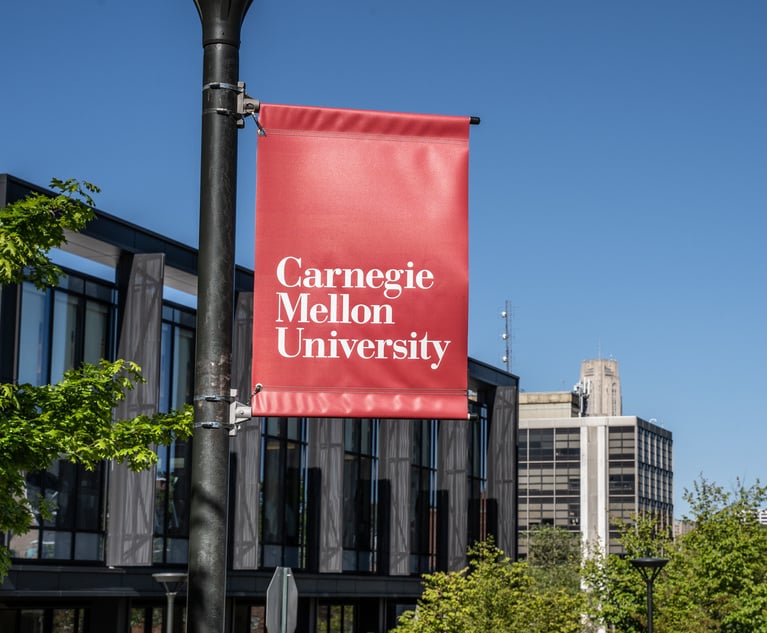 Ashling Ehrhardt and Christopher Carusone of Cohen Seglias Pallas Greenhall & Furman (Photo: Courtesy Photo)
Ashling Ehrhardt and Christopher Carusone of Cohen Seglias Pallas Greenhall & Furman (Photo: Courtesy Photo) College Compliance With Title IX: Will You Be Ready by Aug. 14?
As colleges were scrambling to adjust to the new normal of virtual learning—and all of the challenges that brought—the Department of Education dropped another bombshell May 6 with the issuance of its final rule, requiring that schools be compliant by Aug. 14.
August 06, 2020 at 11:31 AM
7 minute read
No one would have bet that the Department of Education would have released the new Title IX regulations amid a pandemic. As colleges were scrambling to adjust to the new normal of virtual learning—and all of the challenges that brought—the Department of Education dropped another bombshell May 6 with the issuance of its final rule, requiring that schools be compliant by Aug. 14. For all colleges still revising your sexual misconduct policies to ensure timely compliance, here are some reminders:
- Formal Complaint—As attorneys, we think of a formal complaint as a numbered paragraph document that is very legalistic. The good news is that this "formal" complaint is not so formal. The purpose is to ensure that the school has a written document stating the complainant wants an investigation to begin. The document also has to describe the allegations and be signed by the complainant. "Signed" has some leeway, too, either a physical or digital signature or a statement that the complainant is filing the complaint. The complaint can be filed in person, by mail or by email to the Title IX coordinator, as well as by any other method a college chooses.
- Written Notice of Allegations to Parties—Once a complainant files a formal complaint, the first order of business is to send a written notice of the allegations to both parties, which must be sent before any initial interviews. There are strict requirements as to what this notice must state. First, it must describe the key details of who, what, where and when. The notice must also provide that the respondent is presumed innocent and outline the potential sanctions if the respondent is found responsible. It must advise that parties can select an advisor of their choice, who can be an attorney. The notice must also state that parties can request to inspect and review all evidence. In addition, the notice must contain information regarding false statements and the Code of Conduct.
- Mandatory Dismissals—Gone are the days when colleges felt obligated to investigate every single allegation of sexual harassment—no matter where it occurred. Effective Aug. 14, if the complaint alleges sexual harassment that happened outside of the United States, the college must dismiss it. Similarly, if the conduct alleged does not meet the definition of sexual harassment or did not occur within the school's education program or activity, the college must dismiss it. In the case of any dismissal, the college is required to give written notice with its reasons for the dismissal. Revised policies should include language to this effect. If your college would like to ensure that the conduct in question is still addressed, you can include language that the Code of Conduct would govern instead of Title IX.
- Making Evidence Available for Review—Previously, schools could and would often limit the evidence made available to parties and advisers. Not anymore. If evidence is directly related to the allegations raised in the complaint, colleges must allow parties and advisers to inspect and review the evidence obtained by the college. This includes documents and notes from interviews with parties and witnesses, as well as evidence the school does not plan to use. It is important that your revised policy addresses this point.
- Draft Investigative Report—There are a few things to keep in mind when it comes to the draft investigative report. First, you must provide the report to the parties for review and comment, with parties getting ten days to respond. Your college must also consider any response received before it finalizes the report, which is required to be shared with the parties at least ten days before the hearing.
- Adviser—Each party may be accompanied by one adviser of their choosing during all aspects of case preparation up to and throughout the hearing. The adviser can be a source of personal and moral support to the student and can be, but does not have to be, an attorney. Other than cross-examination or testifying at the hearing as a witness, advisers will not speak or otherwise participate on behalf of the student. The parties are expected to respond to questions on their behalf, without representation by their adviser. Your revised policy must include language offering to provide an adviser of your college's choosing, at no cost, to a party that does not have one, for the purpose of conducting cross-examination at the hearing.
- Live Hearing—If your policy did not include a live hearing, it will now. Thankfully, "live" does not necessarily mean "in-person," as many colleges are going remote for the upcoming academic year or doing a hybrid of in-person and remote classes. If any party requests, the hearing can be held with the parties in separate rooms with the necessary technology to see and hear each other. It would be prudent to include a time frame by which any such request must be made. Colleges also have the discretion to allow any or all parties, witnesses, and other participants to appear at the hearing virtually. If your college has not yet done a Title IX hearing by Zoom, get ready—you will soon.
- Cross-Examination—Yes, this is happening despite the flurry of cases filed objecting to the new regulations. Advisors can cross-examine the other party and all witnesses during the hearing. You should consider including language in your revised policy about the respectful manner in which cross-examination should be done. Cross-exam must be asked "in real time" with back and forth questions. It can also include questions about credibility. The chair of the hearing panel will decide if each question is relevant before a party or witness has to answer it. If the chair decides to exclude a question as not relevant, the chair must explain why. You may want to include language in your policy about how objections will be addressed.
- Participation—Every person has the right to choose to participate in any part of the grievance process. No person will be forced, threatened, coerced, or discriminated against for not participating. Colleges cannot draw any inference from a person's decision not to participate. If a party or a witness chooses not to appear at the hearing or chooses not to answer cross-examination questions, the consequences are great: the chair of the hearing panel must exclude the statements made by that party or witness and evaluate only evidence that does not involve those statements.
- Appeals—Be sure that your revised policy offers appeal rights to both parties. You must advise the parties in writing of the appellate process. Appeals must state the explicit grounds for the appeal, based on one of the following:
- A procedural error or omission occurred that impacted the outcome of the hearing
- Newly discovered evidence, unknown or unavailable during the original hearing or investigation that could affect the outcome
- A conflict of interest or bias of Title IX personnel that affected the outcome
Your school may also want to include additional grounds for appeal, such as the sanctions imposed were substantially disproportionate to the severity of the violation.
Pandemic or not, be sure that your Title IX policies are compliant by Aug. 14. If you need any assistance, contact counsel to ensure compliance.
This content has been archived. It is available through our partners, LexisNexis® and Bloomberg Law.
To view this content, please continue to their sites.
Not a Lexis Subscriber?
Subscribe Now
Not a Bloomberg Law Subscriber?
Subscribe Now
NOT FOR REPRINT
© 2025 ALM Global, LLC, All Rights Reserved. Request academic re-use from www.copyright.com. All other uses, submit a request to [email protected]. For more information visit Asset & Logo Licensing.
You Might Like
View All
Sanctioned Penn Law Professor Amy Wax Sues University, Alleging Discrimination
5 minute read
Pa. Superior Court: Sorority's Interview Notes Not Shielded From Discovery in Lawsuit Over Student's Death
3 minute read
LSAT Administrator Sues to Block AI Tutor From Using ‘Famous, Distinctive’ Test Prep Materials
3 minute read
Disjunctive 'Severe or Pervasive' Standard Applies to Discrimination Claims Against University, Judge Rules
5 minute readLaw Firms Mentioned
Trending Stories
Who Got The Work
J. Brugh Lower of Gibbons has entered an appearance for industrial equipment supplier Devco Corporation in a pending trademark infringement lawsuit. The suit, accusing the defendant of selling knock-off Graco products, was filed Dec. 18 in New Jersey District Court by Rivkin Radler on behalf of Graco Inc. and Graco Minnesota. The case, assigned to U.S. District Judge Zahid N. Quraishi, is 3:24-cv-11294, Graco Inc. et al v. Devco Corporation.
Who Got The Work
Rebecca Maller-Stein and Kent A. Yalowitz of Arnold & Porter Kaye Scholer have entered their appearances for Hanaco Venture Capital and its executives, Lior Prosor and David Frankel, in a pending securities lawsuit. The action, filed on Dec. 24 in New York Southern District Court by Zell, Aron & Co. on behalf of Goldeneye Advisors, accuses the defendants of negligently and fraudulently managing the plaintiff's $1 million investment. The case, assigned to U.S. District Judge Vernon S. Broderick, is 1:24-cv-09918, Goldeneye Advisors, LLC v. Hanaco Venture Capital, Ltd. et al.
Who Got The Work
Attorneys from A&O Shearman has stepped in as defense counsel for Toronto-Dominion Bank and other defendants in a pending securities class action. The suit, filed Dec. 11 in New York Southern District Court by Bleichmar Fonti & Auld, accuses the defendants of concealing the bank's 'pervasive' deficiencies in regards to its compliance with the Bank Secrecy Act and the quality of its anti-money laundering controls. The case, assigned to U.S. District Judge Arun Subramanian, is 1:24-cv-09445, Gonzalez v. The Toronto-Dominion Bank et al.
Who Got The Work
Crown Castle International, a Pennsylvania company providing shared communications infrastructure, has turned to Luke D. Wolf of Gordon Rees Scully Mansukhani to fend off a pending breach-of-contract lawsuit. The court action, filed Nov. 25 in Michigan Eastern District Court by Hooper Hathaway PC on behalf of The Town Residences LLC, accuses Crown Castle of failing to transfer approximately $30,000 in utility payments from T-Mobile in breach of a roof-top lease and assignment agreement. The case, assigned to U.S. District Judge Susan K. Declercq, is 2:24-cv-13131, The Town Residences LLC v. T-Mobile US, Inc. et al.
Who Got The Work
Wilfred P. Coronato and Daniel M. Schwartz of McCarter & English have stepped in as defense counsel to Electrolux Home Products Inc. in a pending product liability lawsuit. The court action, filed Nov. 26 in New York Eastern District Court by Poulos Lopiccolo PC and Nagel Rice LLP on behalf of David Stern, alleges that the defendant's refrigerators’ drawers and shelving repeatedly break and fall apart within months after purchase. The case, assigned to U.S. District Judge Joan M. Azrack, is 2:24-cv-08204, Stern v. Electrolux Home Products, Inc.
Featured Firms
Law Offices of Gary Martin Hays & Associates, P.C.
(470) 294-1674
Law Offices of Mark E. Salomone
(857) 444-6468
Smith & Hassler
(713) 739-1250





